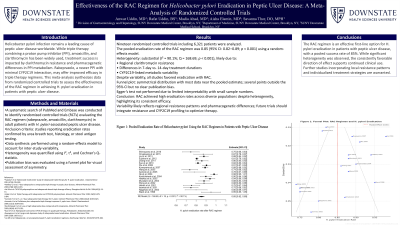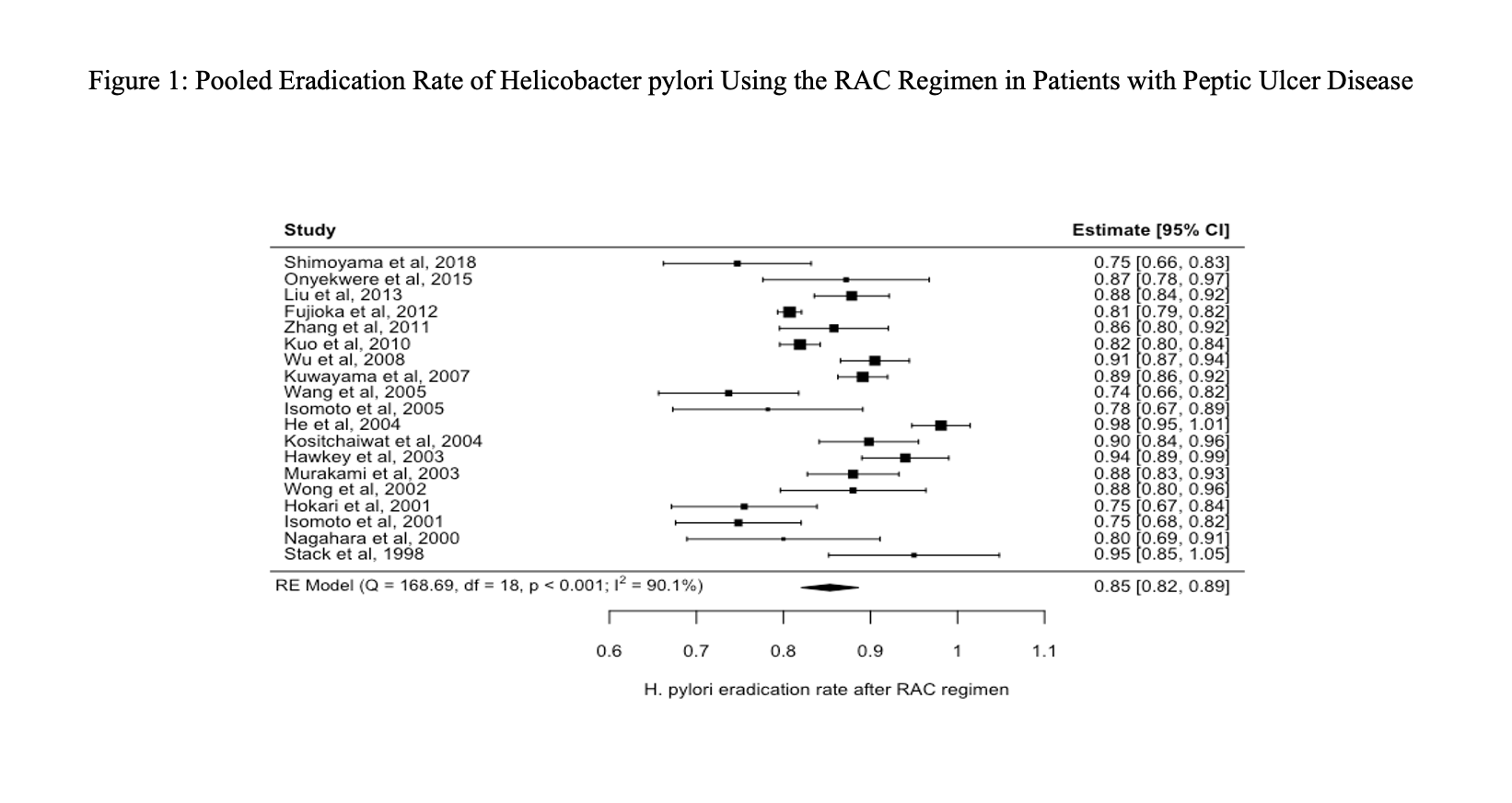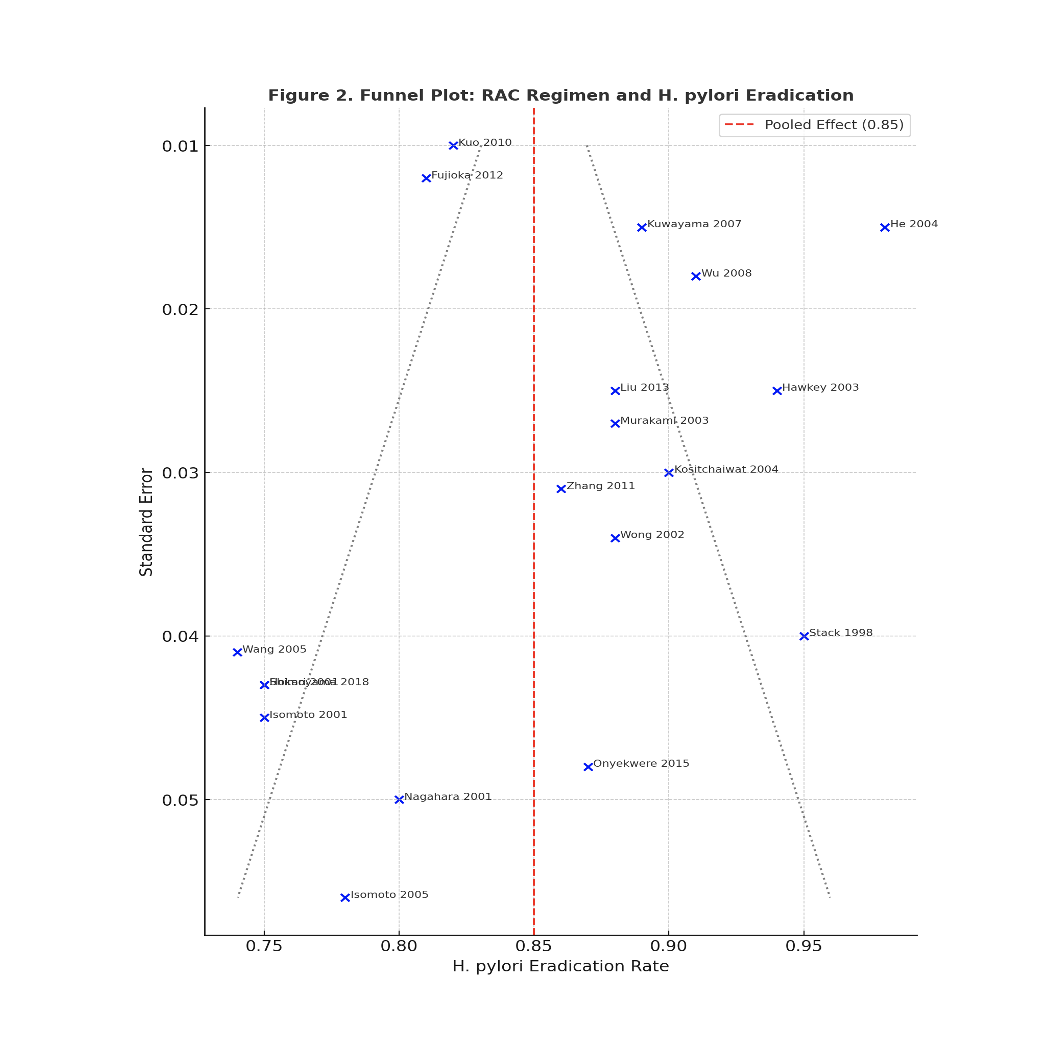Sunday Poster Session
Category: Infections and Microbiome
P1279 - Effectiveness of the RAC Regimen for Helicobacter pylori Eradication in Peptic Ulcer Disease: A Meta-Analysis of Randomized Controlled Trials
Sunday, October 26, 2025
3:30 PM - 7:00 PM PDT
Location: Exhibit Hall

Has Audio
- RU
Rafat Uddin, MS
SUNY Downstate Health Sciences University
Brooklyn, NY
Presenting Author(s)
Anwar Uddin, MD, Rafat Uddin, MS, Madia Ahad, MD, Aisha Elamin, MD, Savanna Thor, DO, MPH
SUNY Downstate Health Sciences University, Brooklyn, NY
Introduction: Helicobacter pylori infection remains a leading cause of peptic ulcer disease worldwide. While triple therapy combining a proton pump inhibitor (PPI), amoxicillin, and clarithromycin has been widely used, treatment success is impacted by clarithromycin resistance and pharmacogenetic differences in PPI metabolism. Rabeprazole, a newer PPI with minimal CYP2C19 interaction, may offer improved efficacy in triple therapy regimens. This meta-analysis synthesizes data from randomized controlled trials to assess the effectiveness of the RAC regimen in achieving H. pylori eradication in patients with peptic ulcer disease.
Methods: A systematic search of PubMed and Embase was performed to identify randomized controlled trials evaluating the RAC regimen in adult patients with H. pylori-associated peptic ulcer disease. Studies were included if they reported eradication rates based on urea breath test, histology, or stool antigen testing. Data were synthesized using a random-effects model. Heterogeneity was quantified using I², τ², and Cochran’s Q-statistic. A funnel plot was used to assess publication bias.
Results: Nineteen randomized controlled trials including 6,321 patients were analyzed. The pooled eradication rate of the RAC regimen was 0.85 (95% CI: 0.82–0.89, p < 0.001) via a random-effects model. Substantial heterogeneity was present (I² = 90.1%, Q = 168.69, p < 0.001), likely due to regional clarithromycin resistance, 7- vs. 14-day durations, and CYP2C19-linked metabolic variability. Despite this, all studies favored eradication. The funnel plot showed a symmetrical spread with most data near the pooled estimate. Several points lay outside the 95% CI, but no obvious bias was evident. Egger’s test wasn’t done due to interpretability limitations. Overall, RAC showed high eradication rates despite significant heterogeneity. The consistent benefit across populations underscores its utility. Resistance patterns and pharmacogenetics likely account for observed variability. Future studies should integrate resistance data and CYP2C19 profiles to refine therapy.
Discussion: The RAC regimen is an effective first-line option for H. pylori eradication in patients with peptic ulcer disease, with a pooled success rate of 85%. While significant heterogeneity was observed, the consistently favorable direction of effect supports continued clinical use. Further studies incorporating local resistance patterns and individualized treatment strategies are warranted.


Disclosures:
Anwar Uddin, MD, Rafat Uddin, MS, Madia Ahad, MD, Aisha Elamin, MD, Savanna Thor, DO, MPH. P1279 - Effectiveness of the RAC Regimen for <i>Helicobacter pylori</i> Eradication in Peptic Ulcer Disease: A Meta-Analysis of Randomized Controlled Trials, ACG 2025 Annual Scientific Meeting Abstracts. Phoenix, AZ: American College of Gastroenterology.
SUNY Downstate Health Sciences University, Brooklyn, NY
Introduction: Helicobacter pylori infection remains a leading cause of peptic ulcer disease worldwide. While triple therapy combining a proton pump inhibitor (PPI), amoxicillin, and clarithromycin has been widely used, treatment success is impacted by clarithromycin resistance and pharmacogenetic differences in PPI metabolism. Rabeprazole, a newer PPI with minimal CYP2C19 interaction, may offer improved efficacy in triple therapy regimens. This meta-analysis synthesizes data from randomized controlled trials to assess the effectiveness of the RAC regimen in achieving H. pylori eradication in patients with peptic ulcer disease.
Methods: A systematic search of PubMed and Embase was performed to identify randomized controlled trials evaluating the RAC regimen in adult patients with H. pylori-associated peptic ulcer disease. Studies were included if they reported eradication rates based on urea breath test, histology, or stool antigen testing. Data were synthesized using a random-effects model. Heterogeneity was quantified using I², τ², and Cochran’s Q-statistic. A funnel plot was used to assess publication bias.
Results: Nineteen randomized controlled trials including 6,321 patients were analyzed. The pooled eradication rate of the RAC regimen was 0.85 (95% CI: 0.82–0.89, p < 0.001) via a random-effects model. Substantial heterogeneity was present (I² = 90.1%, Q = 168.69, p < 0.001), likely due to regional clarithromycin resistance, 7- vs. 14-day durations, and CYP2C19-linked metabolic variability. Despite this, all studies favored eradication. The funnel plot showed a symmetrical spread with most data near the pooled estimate. Several points lay outside the 95% CI, but no obvious bias was evident. Egger’s test wasn’t done due to interpretability limitations. Overall, RAC showed high eradication rates despite significant heterogeneity. The consistent benefit across populations underscores its utility. Resistance patterns and pharmacogenetics likely account for observed variability. Future studies should integrate resistance data and CYP2C19 profiles to refine therapy.
Discussion: The RAC regimen is an effective first-line option for H. pylori eradication in patients with peptic ulcer disease, with a pooled success rate of 85%. While significant heterogeneity was observed, the consistently favorable direction of effect supports continued clinical use. Further studies incorporating local resistance patterns and individualized treatment strategies are warranted.

Figure: Figure 1: Forest Plot of Pooled Estimates

Figure: Figure 2: Funnel Plot
Disclosures:
Anwar Uddin indicated no relevant financial relationships.
Rafat Uddin indicated no relevant financial relationships.
Madia Ahad indicated no relevant financial relationships.
Aisha Elamin indicated no relevant financial relationships.
Savanna Thor indicated no relevant financial relationships.
Anwar Uddin, MD, Rafat Uddin, MS, Madia Ahad, MD, Aisha Elamin, MD, Savanna Thor, DO, MPH. P1279 - Effectiveness of the RAC Regimen for <i>Helicobacter pylori</i> Eradication in Peptic Ulcer Disease: A Meta-Analysis of Randomized Controlled Trials, ACG 2025 Annual Scientific Meeting Abstracts. Phoenix, AZ: American College of Gastroenterology.
